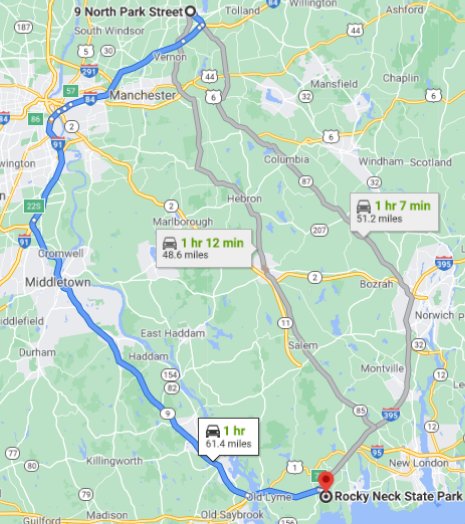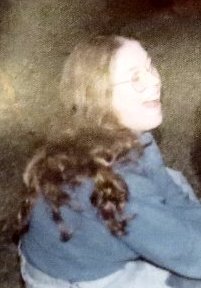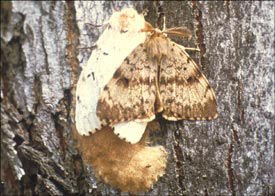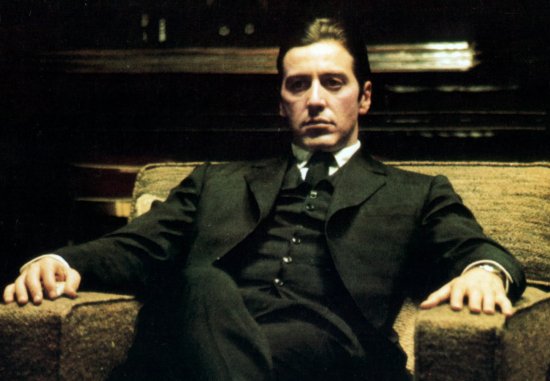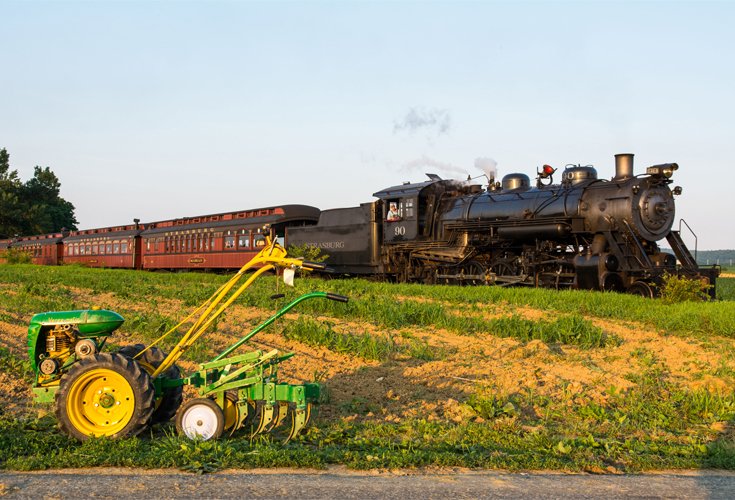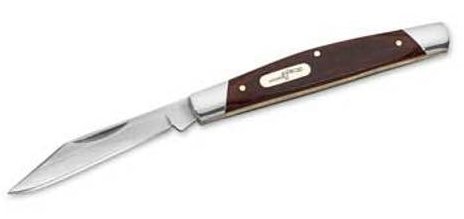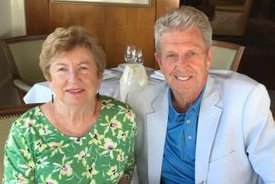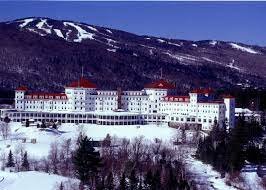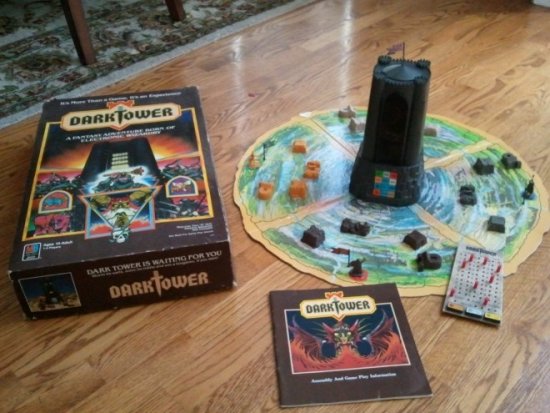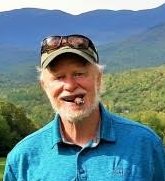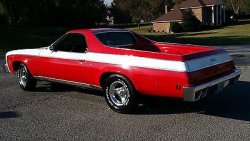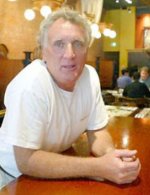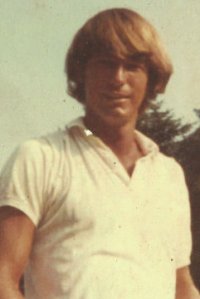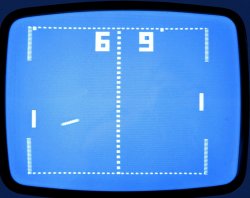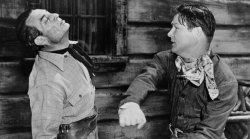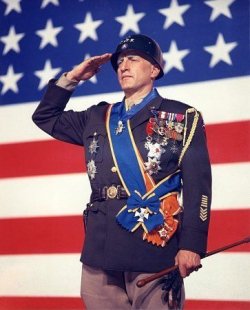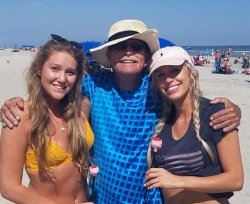We didn’t work every day. Continue reading
The years that we spent in Rockville were mostly happy ones, but we had neither the time nor the money to take much in the way of vacations. The two that we took were for only a week each in 1985 and 1986. They are documented here.
We also made very few exciting or life-enhancing purchases. As in the other blogs about non-business events, the timeline is shaky. I am only certain of the dates of a few events.
The most exciting news of our first year in Rockville came in a phone call in the spring of 1981 from Gerry Cox. He announced that he and a group of Wayne State debaters wanted to pay us a visit in the summer. We looked at our schedules and told him that that would be fine, as long as they could come in June, July, or August. We quickly agreed upon a set of dates. The debaters were Nancy Legge, Al Acitelli, and Mark Buczko.
They drove from Detroit to Rockville. We gave them directions to our house. I think that we advised them to get off of I-91 and take Route 83. We told them that when they could smell the cows they would be in Ellington, the town just north of Rockville. At that point they needed to watch out for the turn. We told them that they should turn uphill (left) onto Upper Butcher Road and then downhill (right) onto Park St. Both of these hills are short, but quite steep.
They found the house. They parked in back, as we directed. We helped them move in. The guys stayed in the bedroom at the top of the stairs, where we had set up bunk beds. Their room was directly above the office. Nancy slept in the waterbed in the spare bedroom, which had not yet been converted into an office for Sue.
They stayed with us for a few days. Everyone had a splendid time throughout the visit. I remember three activities.
- We all spent one day at Rocky Neck State Park. I don’ recall any specifics.
- We devoted one day to Dungeons and Dragons. I am pretty sure that my friend from my insurance days, Tom Corcoran, joined us for that occasion. He played a dwarf fighter. I don’t remember what the other characters were, and, even though I designed it, I don’t remember the dungeon. I also have a vague recollection of creating an adventure for Mark’s assassin character, Cnir Edrum.
- We enjoyed a communal supper, presumably after the D&D game. Al insisted on making pasta from scratch for us. It was definitely good, but I don’t think that he convinced anyone that it was worth all of the effort. He did not insist on making the sauce from scratch. It came from a jar.
Nancy stayed with us for another week or two. We put her to work stuffing envelopes for one of our mailings. This is when I bestowed on her the title of Executive Vice President for International Marketing. We must have included one Canadian addressee.
Gerry came back to visit us a year or two later with a friend of his. I remember much less about that occasion. They stayed with us for a night or two. They probably made additional stops in the Northeast.
I also remember that Craig Kolbitz, a good friend from my army days in Albuquerque in 1971, evidently somehow found my telephone number and address. He called and then came over and visited us one evening. I don’t remember much about the occasion. I don’t think that he revealed much about what he had been doing in the interim. I have not heard from him again in the subsequent decades.
Sue’s sister Betty and her husband Shawn (or maybe Shaun or Sean) Arrowsmith came over for supper at least once. At the time he was a sous chef at the restaurant at Bradley International Airport. That restaurant, which has been closed for decades, was outside of the secured area in the old terminal. It had quite a good reputation.
Their visit to Rockville must have been in late fall or winter. Shawn and I went searching for firewood in the nearby woods. He was a big guy; he brought back a lot more than I did. I started a fire in the fireplace.
They invited us over to their place, too. Their house was surrounded by maple trees. I have a strong recollection of hearing the sounds of the droppings of gypsy moth caterpillars on the roof.
Shawn and Betty did not stay together very long. I don’t know what happened.
The Corcorans—Tom, Patti, Brian and Casey—also came over at least once. I fixed country-style ribs and sauerkraut for them. The meal was a big hit, especially for Brian who had understandably low expectations for such a foreign-sounding meal.
We might have had other visitors, but I don’t remember them.
We made the drive from Rockville to the Corcorans’ house many times. We usually came over for supper and then played games until well after midnight. We were especially appreciative of the suppers. Throughout this period we seldom had, in my dad’s words, “two nickles to rub together”. We almost never went to restaurants. The Corcorans almost always had a special meal for us, often steak. Of course, there was plenty of beer.
Among the games Trivial Pursuit was a definite favorite. We played many different editions. Careers was also a favorite, but we soon discovered that the original version, which had uranium prospecting, Hollywood, expedition to the moon, and at sea as possible careers, was a much better game than the more recent versions. Clue (regular and its expanded versions) were pretty good. When everyone got tired we played Yahtzee.
I also remember enjoying a murder mystery game based on Clue that required playing a scene on a VHS tape. We tried dozens of other games as well. Our basement is full of games, and the Corcorans had more than we did.
We also often celebrated New Year’s and several other holidays with the Corcorans. We watched Brian and Casey grow up. Casey was an acrobat, and Brian excelled at taking things apart and putting them back together. He loved to play with go-bots and transformers.
I also remember showing Brian how to do both types of Indian wrestling—standing up and lying down, the way that Andy Burnett did on Walt Disney.
The closest thing that we had to a vacation during the “anything for a buck” days was a Murder Mystery Weekend near Lancaster, PA. It was staged by some actors in and around a fairly nice hotel in the countryside. The theme was a set of killings in a mob family. My character was one of the family members. He was named Dominic (called “Nicky”), and he was newly married.
I picked up a white fedora somewhere and rented a realistic stage pistol with a shoulder holster from a costume shop in Hartford. I was really ready to get into it. After all, even by that time I had read at least a hundred murder mysteries.
The organizers made me stow the pistol away. Didn’t they know that the only thing that can stop a bad guy with a gun is a good guy with a gun? I should have quoted Charlton Heston to them: “I’ll give you my gun when you pry it from my cold, dead hands.” I still wore the shoulder holster.
The first murder occurred pretty much in full sight of everyone at the first gathering. A fairly large Italian guy wearing a three-piece suit was found dead. He had been stabbed in the heart with a pocketknife.
It is a thoroughly documented fact that all Italian mobsters wear sleeveless undershirts.So, the knife, even if it missed the broad lapels would have needed to penetrate the suit coat, the vest, the shirt, the undershirt, the skin, and the rib cage. Maybe Andre the Giant could kill someone who was wearing all this armor with one casual blow with a pocketknife, but I didn’t see anyone in our group who looked capable of such a feat. Even if sufficient thrust was employed, I would bet on the blade breaking or sliding to one side before it penetrated all of those layers of protection..
Several scenes that involved some or all of the actors were staged. One took place on the Strasburg Rail Road. I don’t remember the details.
We were allowed to submit written questions. Mine was about some flowers that a character had reportedly ordered for some reason. I was told that the answer, which I don’t remember at all, had important information, which I should share with the other guests. I dutifully disclosed it to everyone with whom I conversed.
At the end everyone was supposed to write up a solution. The best one, as judged by the organizers, won a prize. No one got the solution right. The person to whom the prize was awarded missed out on most of the clues entirely. She had spent most of her time shopping in Lancaster.
The revealed murderer was the smallest member of the cast, perhaps 5’2″ and 100 pounds. She was absolutely incapable of committing the first murder. In fact, I don’t think she could have killed him with a pocket knife if he was already unconscious and wearing nothing but his sleeveless undershirt.
In addition, she had no motive for the other crimes attributed to her. That is, the personality that we knew had no motive. She supposedly had multiple personality disorder1, and the diminutive body that she shared with two other personalities committed the other two murders. Give me a break.
For Halloween of 1981 or 1982 Sue and I drove to Brooklyn for a costume party thrown for her friend Eddie Lancaster from Brothers Specifications in Detroit. Sue dressed as Peter Pan. I came disguised as a college professor who never got tenure. It was a long drive, but no drive was too long for Sue if friends were at the other end. She loved to sit and talk with old friends, and she made new ones very easily.
We also drove up to Vermont to see Sue’s friend Diane Robinson at least once or twice. I met her husband Phil Graziose, one of the Air Force guys from the Alaska adventure. He seemed like a nice guy. He set up a small business in the St. Johnsbury area as a locksmith. They lived in a trailer park, a new experience for me. There were things that I could talk about with Phil, even football! I had nothing in common with Diane and her myriad relatives, almost all of whom stayed close to home. Sue absolutely adored this family. I have never quite understood this. Maybe she appreciated the way that they all got along.
In 1981 or 1982 we were invited to Dave Tine’s house. His television had a huge rear-projection screen. It was the first “home entertainment center” we had ever seen. His sister (whose name I don’t remember) owned and operated a retail store name Video Land. It sold hardware as well as videos. We watched Nine to Five together. This was something of a real treat for us. We almost never went to movies. They were too expensive.
Sue’s family in Enfield held get-togethers pretty often. I usually accompanied her. I really struggled at these affairs. I had a hard time talking with most of her Enfield relations. The big exception was her youngest sister, Betty. She hosted a large party at her parents’ house most summers. She set up areas for volleyball and croquet. Also, Betty’s mother had a swimming pool. Tom Corcoran also attended most of these affairs.
I think that it was at one of these parties that I met Jack LaPlante, the brother-in-law of Sue’s sister Karen. He worked and coached at Hartford Public High School, which over the years became a rough place. He has been inducted into the school’s Hall of Fame.
I always enjoyed talking with Jack. He was fascinated by the fact that we still played board games with other adults.
Betty’s friends were much more approachable for me than the relatives on the Locke side. The lives of the latter seemed to center around trucks and cars. I liked all of Betty’s friends. Karen Shapiro, who worked with disadvantaged kids, ended up marrying Paul Locke, and so I saw her occasionally. Jeffrey Campbell, a pharmacist whom Betty has always called Pancho, was around from time to time. In 2015 he came with us on our epic trip to Tanzania, which is described in great detail here.
I also remember a friend of Betty’s named Harriet, but I don’t remember much about her.
I remember that we drove to Rhode Island once to visit Victor Barrett, with whom Sue worked at F.H. Chase, and his wife, Mary Codd2. They ran a small business called Coddbarrett Associates that developed computer-generated graphics for companies.
It was interesting to talk to another couple who were struggling as pioneers in an infant industry. Their work needed a lot more processing power than ours, and so their financial commitment was greater. On the other hand, they also had better credentials. Actually, everyone had better credentials than we did.
One thing that I remember vividly is that Victor and Mary almost never cooked. They either ate frozen dinners or something from a restaurant. Sue and I never did the first and almost never did the second.
Sue had an annual tradition of visiting her land in Monson, MA, on the weekend of Columbus Day when the foliage was at its peak, and the weather was to her liking. I accompanied her a few times. She actually built an outhouse and a tree platform up there. The outhouse was trashed by someone and the tools that she left up there were stolen.
She could sometimes talk her nephew, Travis LaPlante, and/or Brian Corcoran into making the pilgrimage with her.
Sue planned a weekend outing for us in Mt. Washington, NH. We stayed at the famous hotel5 in Bretton Woods. We took the cog railroad up to the top of the mountain, which is one of the windiest places on earth.
Sue planned on me playing golf on the links course that is adjacent to the hotel, but I did not feel like it.
I think that Tom and Patti Corcoran joined us for one day. I seem to recall that Sue and Patti played Tennis. Well, Patti played, and they both chased Sue’s errant shots.
I remember that the hotel hosted a Trivial Pursuit game in the evening. Sue and I played as a team. We really cleaned up. One of the other guests asked us if we had memorized all the answers.
Sandy Bailey, whom we knew from our installation at Harland-Tine, invited us to her house in Manchester, CT, for an evening of games. We were, as usual, late. A group of people were playing Dark Tower, the game advertised on TV by Orson Wells. It seemed like a very interesting game, but I never got around to playing it. I later tried to purchase a copy, but I could not find one.
We met Sandy’s housemate, a guy who worked for the Digital Equipment Corporation. Of course, he tried to convince me that we should convert our ad agency software to run on DEC machines. He even gave me a handbook for DEC’s version of the BASIC language.
In the fall of 1987 Sue and I decided to drive to Washington, DC, for the weekend. We left on Friday afternoon, October 9, and got as far as New Jersey. We stopped at a motel off of the Interstate. The person at the desk seemed surprised that we wanted to stay the whole night. When Sue asked for more towels, he went across the street to a store and bought some.
We laughed about it; it was not that sleazy-looking from the outside.
When we arrived in Washington we spent the day at the National Zoo. We got to see the baby pandas. A male orangutan effortlessly hurled his poop over the fence at the tourists. Overall it was a very pleasant experience, even though I was never able to spot the kiwi in its dark cage.
We stayed overnight at Howard Johnson’s. When we went to supper, the other people in the restaurant seemed somehow different. It wasn’t until later that we realized that we had chosen to come to Washington on the same day as about 200,000 gay people who were in town for “The Great March”.
On Sunday the parking was a nightmare, but the Smithsonian’s museums were not crowded at all.
In late 1985 my sister Jamie surprisingly reentered our lives She had recently married Joe Lisella. Joe, Jamie, and her daughters moved to Simsbury, CT. For the next fourteen years I spent as much time as I could with her and her family, which grew fairly rapidly after she came to New England. Those visits and trips are documented here.
1. This phenomenon is now known as dissociative identity disorder, which is a better name because of the vague nature of the word personality. I personally suspect that the kind postulated in this story occurs more often in the movies than in real life.
2. Mary Codd’s story can be read at her website, which is marycodd.com.
3. The Whalers’ last season was 1997. The Civic Center underwent drastic remodeling in 2004 and in 2021 it is called the XL Center.
4. My recollection of the event was faulty. When I have told this story to people I have claimed that neither of the teams made the playoffs that year. I apologize for the unintentional misinformation. The Whalers lost to Montreal in the first round of the playoffs.
5. Since 2015 it has been called the Omni Mt. Washington Resort.

